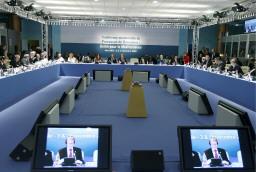Ministers agreed to give the go-ahead for a Union for the Mediterranean on Tuesday, after hammering out a string of compromises over key stumbling blocks during two days of intense negotiations.
Representatives from 43 Mediterranean countries have been working in this French port since early Monday to work out differences over how the new body will operate.
The Union for the Mediterranean was officially launched in July but member states continued to squabble over the organization's location and how posts within the organization would be allocated.
There was also tension over what role, if any, the Arab League would have within the Union.
Speaking as she returned to the talks on Tuesday morning, European Union External Relations Commissioner Benita Ferrero Waldner expressed her confidence.
''A pre-agreement has been reached over the thorniest issues and I am certain of a positive outcome by the end of the day,'' she said.
Delegates have apparently accepted Spain's offer to house the Union in a former royal residence in Barcelona.
Compromises have also been reached over top posts within the new bureaucracy.
Although a secretary general has not yet been decided, delegates have agreed that he or she will come from one of the Union's southern states.
The secretary general will be supported by five deputies, one each from Italy, Malta, Greece, Israel and the Palestinian Territories.
The body will have two presidents, initially from France and Egypt who will retain the post for two years.
After that, there will be one president selected from the non-EU states, who will retain the post for two years, and one from the country that holds the EU's current presidency, meaning a six-month rotational system.
Italian Foreign Undersecretary Stefania Craxi expressed her satisfaction at Rome's inclusion in the secretariat, during a break in talks.
''Right from the start, Italy decided not to push for a role as secretary general but to instead work towards becoming a member of the decision-making body,'' she said.
The sensitive issue of the Arab League also appears to have been resolved.
Israel has dropped its steadfast opposition to the organization's inclusion in exchange for greater powers.
Delegates were in a buoyant mood leaving the talks on Tuesday.
''For the first time Israel has agreed to support an Arab peace initiative - this is an historic moment,'' said Egyptian Foreign Minister Aboul Gheit.
French minister Bernard Kouchner was equally excited at the outcome.
''The minister of a state that doesn't exist, Palestine, talked at length with his Israeli colleague and they decided to work together,'' he said.
''This is already real progress, and it could be we'll go even further tomorrow''.
The idea of a Mediterranean union was first launched by French President Nicolas Sarkozy during his presidential campaign in 2007.
His original vision was limited strictly to countries on the Mediterranean Sea and excluded the EU. He suggested an integrated Euro-Mediterranean region jointly managing security, energy, immigration and other policy issues.
But resistance from other European states, particularly Germany, has resulted in a much looser alliance with less ambitious goals.
The original name, the Mediterranean Union, was ditched, and in its current incarnation the initiative will focus on areas such as improving energy supplies, fighting pollution, boosting maritime surveillance and creating a shared scientific community.










